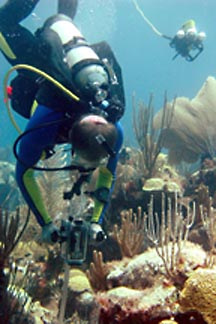|
Welcome to the Counting Corals pilot site.
 We are seeking funding to create Counting Corals, an online service which will provide educators with access to the same coral reef transect images that scientists use to moniter the health of these ecologically important and fragile habitats. The full version of this site will be a collection of video transect images, guide, and self tests so students and members of the public can quantify coral and other benthos coverage in four different reef zones. These zones differ in physical parameters such as wave action, depth, light, and sedimentation. You will be able to create and test hypotheses to investigate how environmental parameters affect which taxa thrive in what conditions and to generate data and make conclusions. You will be able to submit data and compare your work with that of others including our scientists. In our experience as educators at a field station, students of all ages are highly motivated to learn about coral reefs. However, access to participatory learning experiences on these colorful high diversity ecosystems is limited to a small minority of students. The Counting Corals team proposes to change that.
We are seeking funding to create Counting Corals, an online service which will provide educators with access to the same coral reef transect images that scientists use to moniter the health of these ecologically important and fragile habitats. The full version of this site will be a collection of video transect images, guide, and self tests so students and members of the public can quantify coral and other benthos coverage in four different reef zones. These zones differ in physical parameters such as wave action, depth, light, and sedimentation. You will be able to create and test hypotheses to investigate how environmental parameters affect which taxa thrive in what conditions and to generate data and make conclusions. You will be able to submit data and compare your work with that of others including our scientists. In our experience as educators at a field station, students of all ages are highly motivated to learn about coral reefs. However, access to participatory learning experiences on these colorful high diversity ecosystems is limited to a small minority of students. The Counting Corals team proposes to change that.
This pilot site contains a sample part of a simplified coral and other benthos identification guide, the Coral ID Guide. Next we present 6 sets of sample digital transect images in the Reefs section. Two of these transects, one each on a Terrace reef and a Lagoon reef have been prepared for pilot analysis. Our pilot transect data sheet may also be downloaded from this area as well. The Miscellaneous section contains images of corals, coral reef animals, PowerPoint presentations, a FAQ page and a large barrel full of monkeys. Finally, you may correspond directly with Counting Corals staff by clicking on the Contact Us link.
Yours truly,
Dr. James B. Wood
jwood@countingcorals.org
|

